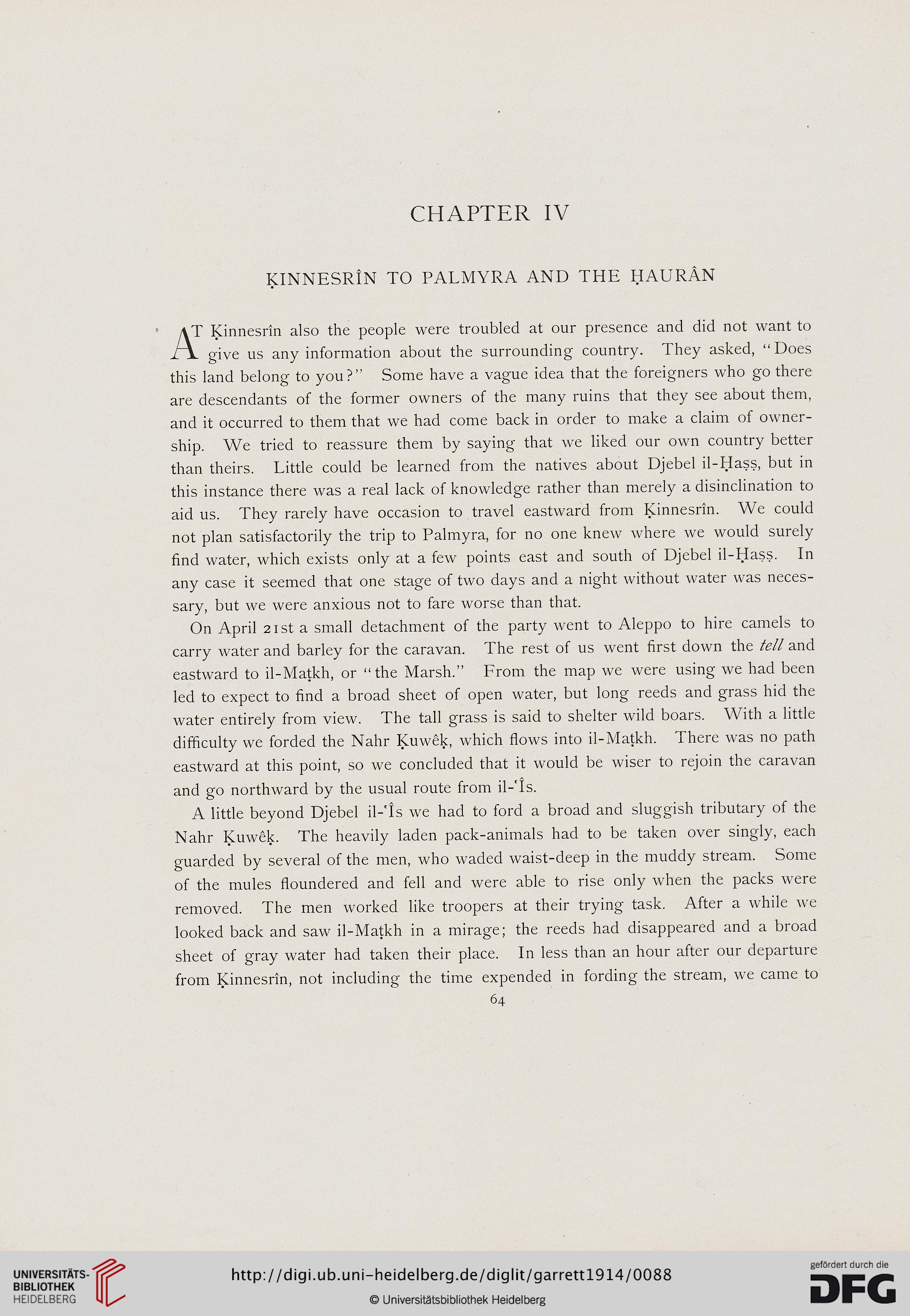CHAPTER 11/
KINNESRiN TO PALMYRA AND THE HAURAN
AT Kinnesrin also the people were troubled at our presence and did not want to
/A give us any information about the surrounding country. They asked, "Does
this land belong to you?" Some have a vague idea that the foreigners who go there
are descendants of the former owners of the many ruins that they see about them,
and it occurred to them that we had come back in order to make a claim of owner-
ship. We tried to reassure them by saying that we liked our own country better
than theirs. Little could be learned from the natives about Djebel il-Hass, but in
this instance there was a real lack of knowledge rather than merely a disinclination to
aid us. They rarely have occasion to travel eastward from Kinnesrin. We could
not plan satisfactorily the trip to Palmyra, for no one knew where we would surely
find water, which exists only at a few points east and south of Djebel il-Hass. In
any case it seemed that one stage of two days and a night without water was neces-
sary, but we were anxious not to fare worse than that.
On April 21st a small detachment of the party went to Aleppo to hire camels to
carry water and barley for the caravan. The rest of us went first down the /<?// and
eastward to il-Matkh, or "the Marsh." From the map we were using we had been
led to expect to hnd a broad sheet of open water, but long reeds and grass hid the
water entirely from view. The tall grass is said to shelter wild boars. With a little
difficulty we forded the Nahr Kuwek, which flows into il-Matkh. There was no path
eastward at this point, so we concluded that it would be wiser to rejoin the caravan
and go northward by the usual route from il-Ts.
A little beyond Djebel il-Ts we had to ford a broad and sluggish tributary of the
Nahr Kuwek. The heavily laden pack-animals had to be taken over singly, each
guarded by several of the men, who waded waist-deep in the muddy stream. Some
of the mules floundered and fell and were able to rise only when the packs were
removed. The men worked like troopers at their trying task. After a while we
looked back and saw il-Matkh in a mirage; the reeds had disappeared and a broad
sheet of gray water had taken their place. In less than an hour after our departure
from Kinnesrin, not including the time expended in fording the stream, we came to
64
KINNESRiN TO PALMYRA AND THE HAURAN
AT Kinnesrin also the people were troubled at our presence and did not want to
/A give us any information about the surrounding country. They asked, "Does
this land belong to you?" Some have a vague idea that the foreigners who go there
are descendants of the former owners of the many ruins that they see about them,
and it occurred to them that we had come back in order to make a claim of owner-
ship. We tried to reassure them by saying that we liked our own country better
than theirs. Little could be learned from the natives about Djebel il-Hass, but in
this instance there was a real lack of knowledge rather than merely a disinclination to
aid us. They rarely have occasion to travel eastward from Kinnesrin. We could
not plan satisfactorily the trip to Palmyra, for no one knew where we would surely
find water, which exists only at a few points east and south of Djebel il-Hass. In
any case it seemed that one stage of two days and a night without water was neces-
sary, but we were anxious not to fare worse than that.
On April 21st a small detachment of the party went to Aleppo to hire camels to
carry water and barley for the caravan. The rest of us went first down the /<?// and
eastward to il-Matkh, or "the Marsh." From the map we were using we had been
led to expect to hnd a broad sheet of open water, but long reeds and grass hid the
water entirely from view. The tall grass is said to shelter wild boars. With a little
difficulty we forded the Nahr Kuwek, which flows into il-Matkh. There was no path
eastward at this point, so we concluded that it would be wiser to rejoin the caravan
and go northward by the usual route from il-Ts.
A little beyond Djebel il-Ts we had to ford a broad and sluggish tributary of the
Nahr Kuwek. The heavily laden pack-animals had to be taken over singly, each
guarded by several of the men, who waded waist-deep in the muddy stream. Some
of the mules floundered and fell and were able to rise only when the packs were
removed. The men worked like troopers at their trying task. After a while we
looked back and saw il-Matkh in a mirage; the reeds had disappeared and a broad
sheet of gray water had taken their place. In less than an hour after our departure
from Kinnesrin, not including the time expended in fording the stream, we came to
64





